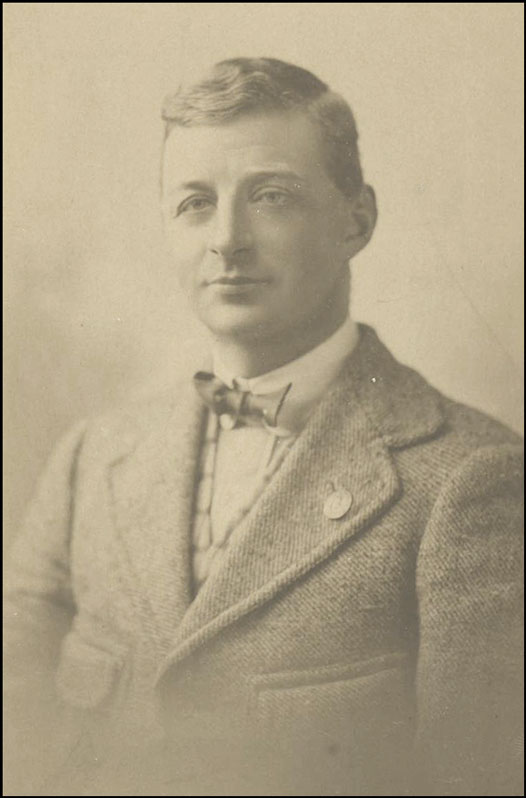![]() In memoriam
In memoriam ![]()
Major Holt Waring, MID
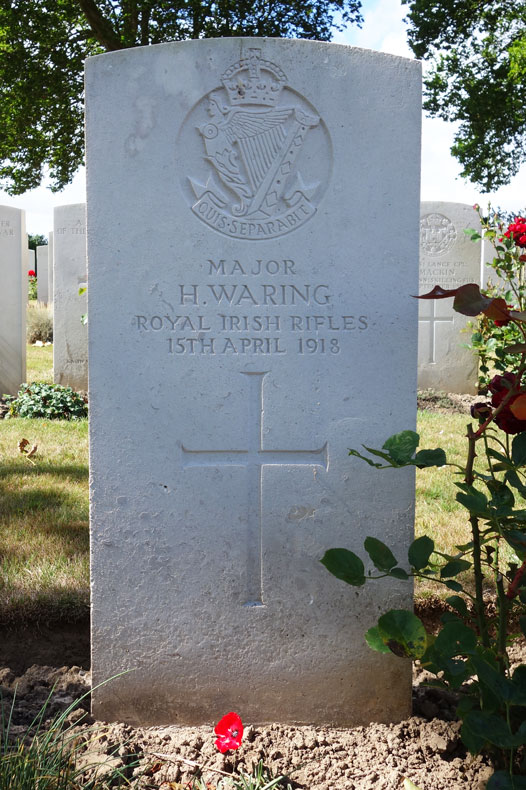
Holt Waring, of Waringstown, Co. Down, was born on 26 May 1877, the son of Colonel Thomas Waring and Fanny Waring (nee Tucker). He was husband of Margaret Waring of Waringstown, County Down, and brother-in-law of Lieutenant Samuel Barbour 'Barrie' Combe, also of the North Irish Horse.
Having served in the Boer War, Waring was commissioned as a lieutenant on 17 July 1903 and joined the North of Ireland Imperial Yeomanry. In July 1908 he joined the newly-formed North Irish Horse. He was promoted to captain on 6 February 1909 and major on 12 December 1914.
In October 1914 Waring's brother, Lieutenant Commander Ruric Waring, was lost at sea when HMS Hawke was sunk by a German U-boat. His brother-in-law, Barrie Combe, was killed on 30 September 1914. Waring wrote to his sister, Combe's widow:
Cople House, Bedford
12.12.14.
Dear MaryJust a line to say how sorry I am about poor Barrie. Roy’s news seems pretty certain and what we would expect. It’s awfull hard luck on you and the kids and small consolation that he died the man he always was. You must have realised all along as I did that the idea of his walking round a corner and no shots being fired was absurd as he would have had a go anyway.
Margaret came over to Staunton the other night and I have a room in a pub for her here now but don’t know whether it will be possible or not however she was mad on coming as she fully believes we are off to France at once, and I see no prospect of it for some time. So go and set up shop at home if it would suit you.
Try and keep your tail up and the best of sympathy old girl.
Your loving brother
Holt Waring
Waring had joined the newly formed D Squadron of the North Irish Horse, which arrived in France on 2 May 1915, attached to the 51st (Highland) Division. Later that month he took command of C Squadron of the North Irish Horse, which had been in France since the beginning of the war. On 27 December he wrote to his sister Esther:
Many thanks for yours and your good wishes. We have got Xmas over without any trouble. I hear from Margaret that Mary seems content enough and (Daisy Ricketts?) is helping to stir her up a bit. She wants it poor devil bad enough, as in a way she seemed to have chucked her hand in. The Hun has been very quiet since the show last Sunday. He threw a lot of stuff about as you say but did very little harm, and the way his gas attack was defeated was grand. It did a lot of good as everyone now has complete confidence in the gas helmets which proved themselves perfect. Of course you have to get them on pretty quick. Margaret got home alive and does not seem to have killed herself this trip.
Best of love and good wishes for 1916.
ever your loving brother.
Holt.
On 4 August 1916 Major Waring was attached to the 13th Battalion, Royal Irish Rifles.
Major Waring led his men when the 36th Ulster Division and the 16th Irish Division attacked at the Battle of Messines in June 1917. Two months later he took command of the 13th Rifles when Colonel Maxwell was wounded at the Battle of Passchendaele.
On 3 October 1917 he wrote to his sister Esther:
Many thanks for yours which should have got an answer long before this but I have really been busy especially in the letter writing line. We are in a peaceful enough part of the world now and are busy getting things straightened out for the winter there [is] plenty to do all over the place. The Hun seems to be getting enough of it up North both from the papers and gossip. You seem to be having a fairly busy time with raids &c but I gather very little damage has been done. Bob (?)well has gone home I believe and is doing very well. Also B(ert?) the adj and Work(man?) but the latter’s arm will take some time. We expect to be amalgamated with the 11th, Leddie Smyth’s lot and it will be a difficult job and rows for many a day. It’s wonderful the little petty jealousies are knocking about. There’s a chance of your friend Pikeman getting home for 3 or 4 months on a course, but nothing certain yet. He deserves a rest if anyone does. Hope the old lady is doing alright. Best of love and look after yourself.
In November 1917 the 11th and 13th Royal Irish Rifles were amalgamated to form the 11/13th Battalion. When it was disbanded in February 1918 Waring was moved to the 12th Royal Irish Rifles.
On 21 March 1918, the Germans launched a massive offensive. The 36th Division, and the 12th Royal Irish Rifles in particular, sustained heavy casualties.
The survivors were then sent into the lines in the Ypres Salient in the area around Kemmel Hill, just as the Germans commenced an offensive in that sector. On the night of 12/13 April, Waring led a company of 12th Rifles in a counter attack, along with a company of the 9th Royal Irish Fusiliers led by the Lieutenant Colonel Philip Kelly. Their position restored, dawn brought more determined attacks by the Germans on the trenches held by the 12th Rifles. That attack, and others during the day, were repulsed.
At dawn on 15 April, the Germans launched an artillery and infantry attack and broke through on the left flank. Waring led a combined force of the remnants of the 12th Rifles and 1st Royal Irish Fusiliers, and though they failed to win back the ground lost, they stopped the German advance. Holt Waring died of wounds sustained during this action.
The Battalion diary for this action reads:
12th [April]. The South African Brigade which was holding a forward line in front of us were forced to retire thro us owing to their flanks being attacked. This left 108 Brigade holding the front line. The 1st Fus. & 9th Irish Fus. withdrew and occupied the trench on our right. This left the line of defence our old front line trench which was held before the advance of June 7th 1917.
13th. 6 am. Enemy artillery very active on our front line, and very accurate sniping. 8 am. Enemy attacked on our front but was beaten off with rifle and Lewis Gun fire. 5 pm. Enemy again attacked and forced the 9th Irish Fus. to retire. Major Waring by collecting stragglers and those retiring took them forward again at once successfully counterattacked and saved the situation by getting back the lost ground.
April 14th. 9 am. Enemy attacked on the Battn front and was driven off by Lewis Gun and Rifle fire. 12 midnight. Owing to the enemy having got a footing on hill 63 on our right we were ordered to fall back so as to readjust the line.
15th. ... 4 am. Enemy artillery and Trench mortars opened [on] our front line and after one hour & a half of heavy bombardment Enemy Infantry attacked on our front. We were forced to fall back, having sustained heavy casualties during the bombardment, and we took up a line along KINGSWAY trench.
Waring's widow Margaret and his sister Esther received many letters of sympathy following his death, including the following:
Dear Mrs Waring
It is with profound sorrow I write to tell you of the death in action of your husband, one of the bravest men I have ever met. Throughout the Regiment to-day wherever one goes, whether amongst officers or men, there is the same voice heard of admiration for his splendid heroism & deep sorrow that we have lost him. He had been with us for some days and never was a time when his courage and wisdom were so much needed. What he did for us I could not put into words, but daring the bitter fighting in which we had been engulfed since we came into this area about a week ago, he has been the very soul of our resistance the leader of our active opposition. On Monday morning the 15th inst our sector was attacked after a heavy artillery bombardment. He was in the line organizing, encouraging and visiting the various positions. His presence was everywhere most helpful and his cheery words stiffened the courage of all. This he kept doing until he was hit. At first he thought he could walk back to Headquarters to report but becoming faint he was put on a stretcher and died before he reached the aid post. One piece had penetrated a little above the heart & apparently it was this wound which caused his death. He was brought back to where there is a Military Cemetry [sic] & I went there and made arrangements for his burial & found a Padre of his own faith who kind[ly] undertook to conduct the funeral service and some of our own men dug his grave. I hope this is a little comfort to know that his body was reverently and affectionately laid to rest. I have tried to tell you in simple words something of what happened. I feel that I couldn’t put into words the courage of the man or do justice to his great personality and the charm of his fine character as a soldier and leader of men. The words I have already used “the bravest man I have ever met[“] are not only my words. I have heard them dozens of times since he laid down his life. Others will write and tell you the same thing. I trust the knowledge of this will help you in your great sorrow. I join with you & your sorrow tho I know that outsiders like me can only stand outside the door of your home of grief while you meet your sorrow alone within. But while the struggle is going on I hope it is something to know there are other eyes with tears in them and other hearts feeling the pain and the loss. We are passing through a hard time but please God we shall win through in the end. Everywhere there are homes with the dark cloud of sorrow resting on them & hearts that are breaking with that great company of the sorrowful we must try to be brave and patient to help them in their need & for the sake of those who have died so nobly. They would not wish us to grieve over much. They have fought the good fight. They have laid down their lives in the sacred cause of humanity at the feet of the one who “Saved others. Himself he could not save”. Many are treading in His steps to-day & your brave husband is one of the most shining examples.
I feel I could have written better had I known you. But I assure you of my great sympathy & that of all the officers and men in the regiment many who would like to write I fear have no opportunity just now so I should ask you to accept this as for the regiment in the meantime.
Yours in deepest sympathy
Andrew Gibson
[Battalion Chaplain]
Extract from a letter from C.S.M. J. A. Pikeman (No.13391) C Company, 12 & 13th Royal Irish Rifles, passed to Esther Waring:
Tell Miss W. her brother got killed on the 16th of the month. I am very sorry to loose [sic] such a brave man[.] all our Batt are upset over it. If a man ever deserves a V.C. he is the man for it.
Copy of part of a letter written to Mrs Hanson of Larne from her son, Brigade Transport Officer:
You will be sorry to hear we have lost Holt Waring. He was one of the bravest, most gallant soldiers I’ve ever met. He was the life & soul of this last defence & his loss is irreparable.
In a later letter he wrote:
Holt Waring should get the VC or rather his poor wife should get it. The Hun broke us at one point. Holt got out over the top, calling the boys by their Christian names & in about 2 seconds he had them rallied & going up the hill cheering like mad & simply hunted the Hun like sheep. Holt was about 20 yards in front of the lot, stick in one hand & revolver in the other. It was a glorious charge, & simply saved the situation, but the loss of Holt is terrible for us.
An officer of the battalion wrote:
Dear Mrs Waring
I am writing to express my sincerest sympathy with you in your great loss & to tell you what I can about Major Waring’s death. First of all I must tell you how absolutely splendid he was during the recent fighting. He seemed to be everywhere cheering up the men & putting heart into everybody. Just 2 days before he was killed he saved a most dangerous situation for us. The Batt. on our flank gave way during a heavy attack & Major Waring, though it was not his job, reorganized them and personally led them in a counter attack which took back all the ground & saved the situation. Most of the men didn’t know him. They simply recognized a great leader & followed him willingly. Our own men of course would have followed him any where.
he was badly wounded about 5 OC on the morning of the 15th & died just after he got to the dressing station. Six of my men ran out with a stretcher for him into absolutely terrific fire. I don’t believe they would have gone out for anyone else but when they heard it was Major Waring they all wanted to go.
G. Apperson
(Capt.)
12th RIR
North Irish Horse officer, the Earl of Roden, wrote:
My dear Esther
I can’t tell you how sorry I am about poor old Holt & for you all. He was a man and there are damned few of them about now. You are a dear to be worrying about Margaret – she’s alright. Elinor is away in England crossing to-night and will be with her to-morrow. I only heard about it at 5 last night, but went over to see her – of course she’s terribly upset but very plucky & says that if he’d got to go, he went as he wd like to. She showed me the chaplains letter. In case you’ve not yet got full particulars The Huns had bombarded very heavily & then came over – Holt was every where he was wanted & kept the men cheered on, till he was hit – he got it just above the heart, they got him on to a stretcher & he died before they cd get to the 1st aid post even – so he got a quick passage, which is a comfort – Nearly all the men from this village (Bryansford) are in his battalion and their parents are awfully upset about it as their sons always said he was the finest man in the Ulster Division. Margaret is to come here towards the end of the week.
Yours ever
Roden
Waring was buried at Lindenhoek, east of Mount Kemmel (map reference 28.N.27.c.9.5). His comrades placed a cross over his grave which read:
"In loving memory of Major Holt Waring. 13th Royal Irish Rifles. Attd 12th Royal Irish Rifles. Died of wounds, 15.4.18."
After the war his body was exhumed and re-buried at Wulverghem-Lindenhoek Road Military Cemetery, Heuvelland, West-Vlaanderen, Belgium, grave II.E.7. The gravestone inscription reads:
MAJOR
H. WARING
ROYAL IRISH RIFLES
15TH APRIL 1918
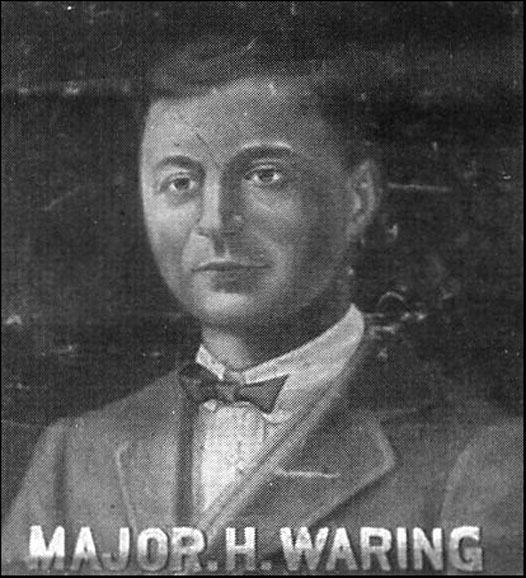
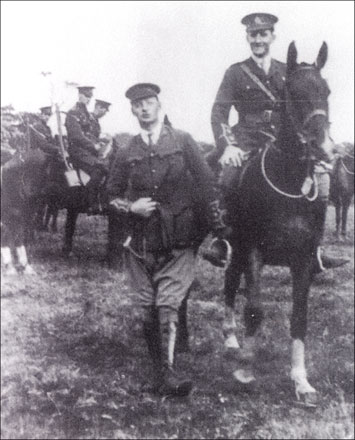
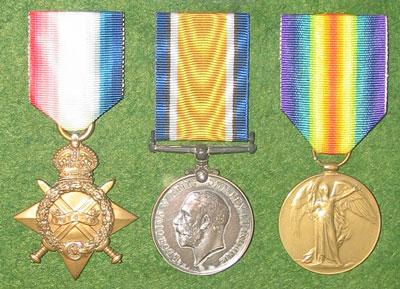
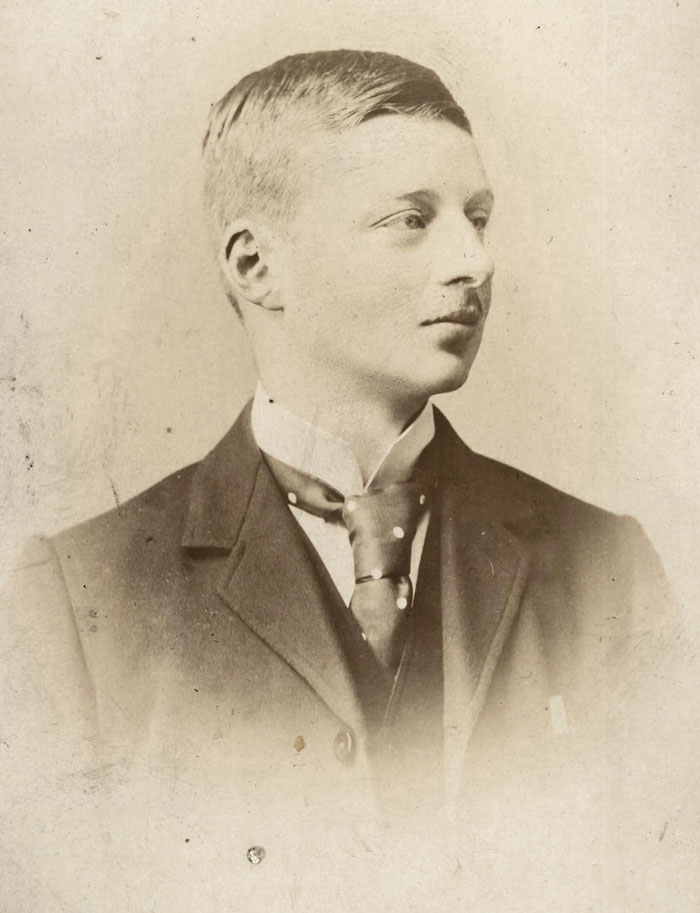
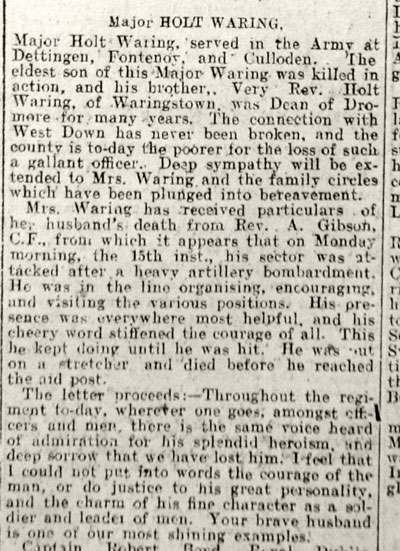
Larne Times and Weekly Telegraph, April 1918
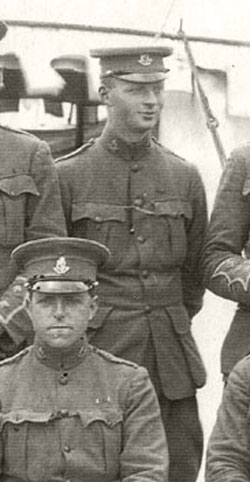
Waring with officers of the North of Ireland Imperial Yeomanry in 1905
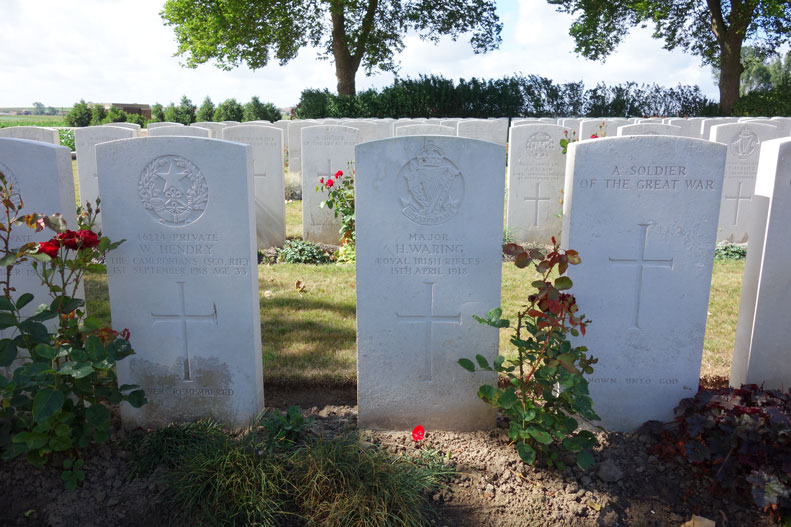
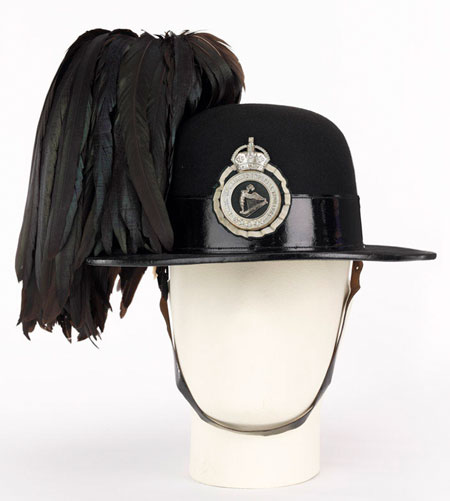
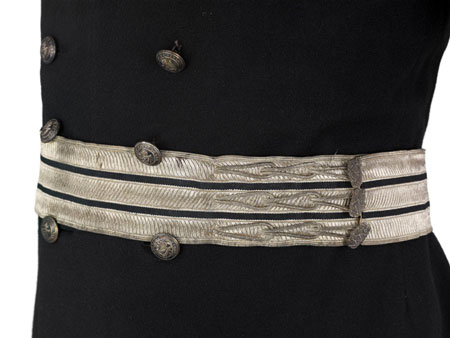
Waring's hat and belt from his pre-war dress uniform
The first and fifth image are from my private collection. Gravestone images Copyright © Phillip Tardif with all rights reserved as set out in this Use of Material policy. The third image is sourced from The Story of a Banner: Waringstown During World War 1, by L. Elliott and D. Stevenson. The fourth image shows Lieutenant (later Lieutenant Colonel) Richard Annesley West (mounted) alongside Captain Holt Waring. It is sourced from Richard Doherty's The North Irish Horse: A Hundred Years of Service. Holt Waring's medals are on display at North Irish Horse headquarters at Dunmore Park Camp in Belfast. The newspaper clipping is kindly provided by Nigel Henderson, Researcher at History Hub Ulster (www.greatwarbelfastclippings.com). The last two images are sourced from the National Army Museum website, accession numbers NAM 1976-08-26-4 and NAM 1976-08-26-17.

